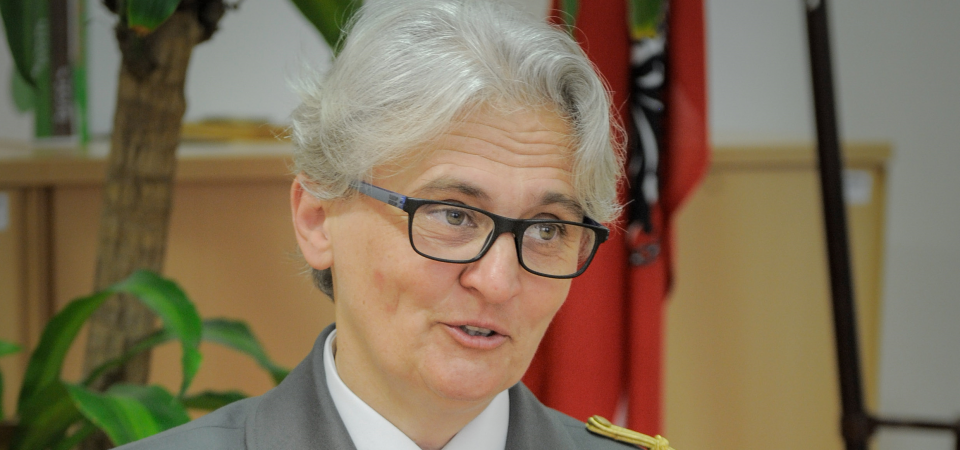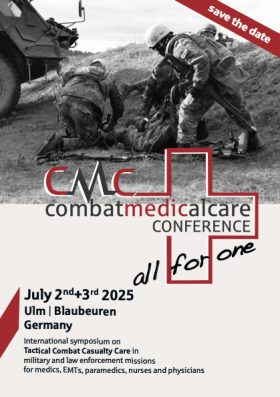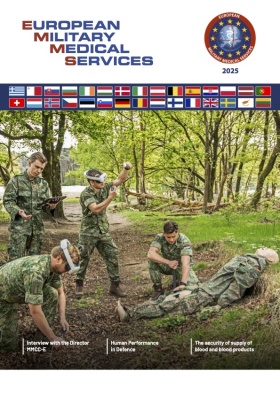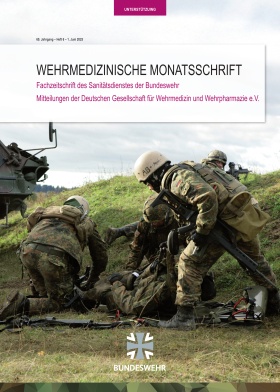

Interview
Interview with Brigadier Sylvia – Carolina Sperandio, Head of the Military Health Department in Austria
· Can you briefly describe to us the important structures of your country's Military Medical Service?
The Military Health Department, of which I have been the head for over a year, is a department of the General Staff and therefore directly represented in the Federal Ministry of Defence. It corresponds to the strategic management level of the Austrian Military Medical Service, which also includes the military pharmacy and veterinary services, under which the field of food hygiene also falls. Two units that are subordinated to the Ministry on the operational management level are the Armed Forces Command and the Armed Forces Command Base, each of which has one department for the Military Health Service.
The three medical centres, each consisting of a command, a military hospital (includes deployable Role 2, a medical training unit and reservists elements), are under control of the Joint Service Support Command. The reservist’s elements have the required medical qualifications but limited military training and are deployed only in case of war.
The 4 Austrian land brigades and the 2 air brigades are under the control of Joint Forces Command. The battalions of the brigades have medical platoons (Role 1) and medical teams. The Role 1 has doctors, nurses, paramedics and skilled first aid men.
Due to the compulsory military service and the legally enshrined reservist’s system in Austria, the medical care for those providing basic military service and soldiers who serve as part of the reservist’s system is ensured in accordance with the Army Fees Act. In return, the military personnel who serve in the professional cadre are not insured by the Army, but instead in the same way as all Austrian civil servants by means of civil, social and health insurance – and are therefore not obliged to have themselves treated at the military health facilities.
· What are the specific features of this?
The Austrian Military Medical Service is characterised above all by the particular flexibility of its personnel, which is founded on many years of varied and profound training based on civil medical laws in combination with additional military training. The medical orderlies of the reserve play an important role – albeit to a significantly lesser extent than in the past unfortunately, owing to the drastic cuts that have been carried out. This is the reason why Austrian civil-military doctors are also deployed in a variety of ways in our missions abroad.
· What is the role of the Medical Service in the Armed Forces of your country?
There is absolutely no doubt in my mind that the important objective of the Military Health Service is to maintain the health of soldiers. In order to fulfil our core task – for instance achieve the optimum performance of the human resources for the armed forces – I would like to highlight the following fields of activity.
The medical examination of army conscripts, which examines all male citizens in Austria with respect to their suitability for military service on the basis of the existing compulsory military service, is of great importance not only militarily, but also in terms of public health. The draft boards are distributed nationwide over six locations and our medical personnel examine approximately 40.000 conscripts per year with the involvement of the Army Psychological Service, which – and it is important to mention this in my view – is not assigned to the military health service unfortunately, but to personnel management.
An aspect, which is often underestimated, but nevertheless indispensable for the health, fitness and ultimately the safety of our own troops is the wide range of tasks associated with prevention. It is an indispensable prerequisite for our "best care practice" – healthcare during deployment.
For this reason, three institutes have been established at the Eastern Medical Centre in Vienna. The most important of these is the Institute for International Medical Support, which carries out all examinations concerning fitness for service abroad, including vaccination programmes and repatriation investigations. Responsibility for the fitness of the flying personnel lies with the Fliegermedizinisches Institut ("Aviation Medicine Institute”), while performance physiology is overseen by the Institut für Leistungsmedizin und Wehrergonomie ("Institute for Performance Medicine and Military Ergonomics").
The Military Medical Service plays an important role in connection with state crisis and disaster management. Here we continue to play a key role in all threat scenarios in Austria – including those, which are not conflict-related – from pandemics and natural disasters to terrorist attacks. Our Medical Service is currently deployed within the framework of the EU Presidency 2018 to support security operations at various meetings, conferences, etc.
· What form does the cooperation with the other branches of the Armed Forces take?
Due to Austria's geography, our Armed Forces do not have a Navy - any longer. For example, the ground and air forces are managed at the operational level as "combined" forces. The medical service ensures the supply of military medicine at all levels within all branches of the service and is unfortunately not an independent branch of the service, but rather an integral part of the respective other branches.
· What developments has your medical service undergone over the last 5 years and what do you believe will be the main focal points of specialist medical care in the future?
As a consequence of extreme savings, the medical services underwent a far-reaching process of reorganisation in 2014 on the basis of a new medical concept from 2011 and the medical organisation process derived from it in 2013. The specified aim of this reorganisation was the increased operational orientation of the existing medical organisation and an increase in efficiency. Due to new strategic military concepts, we are currently in the process of evaluating the current organisation. We are trying - albeit with strongly limited resources, unfortunately - to adapt the future focal points of our medical services both structurally and organisationally to the new challenges and threats, such as international terrorism and disaster protection due to climate change etc. on the Role 1-3 levels and as part of medical training. I also consider our increased training for executive and civilian rescue forces on the basis of the mission-oriented extended military first aid to be essential for this. Further development steps are also being initiated in the broad field of NBC defence, especially with regard to patient decontamination.
· Many Military Medical Services are suffering from a shortage of personnel. What is the situation with you – are you able to fill all positions and – if not – where are their special requirements?
As in other nations, the recruitment of military doctors is a significant problem. For this reason, many military medical positions cannot be filled at the moment. In the field of nursing and emergency medical personnel too, the level of staffing in the various posts will continue to decrease in the coming years due to increasing numbers of individuals leaving the profession and not enough new recruits.
· What incentives do you use to attempt to convince applicants of the attractiveness of such work?
Increasing salaries, more flexible service contracts as well as special training and further education offers are only a few measures that are intended to make the job description of the military physician in the Austrian Armed Forces more attractive. In contrast to the family and "work-life-balance”-friendly offers in the civilian health service, which is also struggling with a lack of doctors, the strong demands in terms of flexibility and level of commitment of an officer in the military medical service is unfortunately only rarely a sought-after alternative.
· Where do you train your medical staff?
The medical training and training in general of military physicians has a long tradition within the Austrian military. As long ago as the early 19th century, for example, there was the "Josephinum", where military physicians were trained specifically with regard to military challenges and which later played an important role in the internationally recognised civilian "Vienna Medical School".
The training of the medical service is divided up into the professional groups of rescue and emergency paramedics, qualified health and nursing staff, medical-technical services as well as doctors, pharmacists and veterinarians. The rescue and emergency paramedics are trained at the army's own approved medical training facilities in accordance with civilian laws and regulations. The internships are carried out at civilian rescue organisations. The qualified health and nursing personnel are trained according to civilian laws and regulations at the Health and Nursing School of the Austrian Armed Forces and the internships carried out in civilian hospitals The training as a medical non-commissioned officer includes the aforementioned rescue and emergency paramedics training, the completion of the health and nursing training, as well as the entire military non-commissioned officer training – appropriate for all other branches of the service – at the Army Non-commissioned Officers Academy. Doctors, pharmacists, veterinarians and medical-technical personnel complete their training at civilian universities or academies and are specifically trained in military medicine after joining the Armed Forces. The academic staff completes their basic military medical training, a series of training courses specific to military medicine, e.g. a course in disaster medicine, further training in emergency or tropical medicine, and finally a military training course at the National Defence Academy. In order to maintain their skills and abilities, non-commissioned medical officers and doctors cooperate with civilian hospitals and rescue organisations. In addition, there are bilateral cooperation agreements with the Deutsche Bundeswehr, for example, and a number of further training opportunities at foreign training centres - for example the NATO School in OBERAMMERGAU, with the Armed Forces of the USA, Israel, Switzerland and many other friendly nations, to name a few.
In contrast to other nations, the nursing staff does not yet have a university qualification. However, work is currently going on to develop a model in which training in Austria is to take on a more academic nature by 2024. I consider the implementation, with all its changes in personnel and service laws, as well as budgetary changes, to be a major challenge for the Austrian Armed Forces in the coming years.
· What about the quality of the technical equipment?
The medical equipment conforms to both international and Austria-wide standards and enables modern diagnostics and therapy.
I would like to highlight the new procurement of emergency medical equipment in several armoured medical vehicles - the Dingo.
Together with an Austrian company, we developed the prototype of a medical container for the Hercules C-130 for strategic patient air transport, which can transport two intensive care patients or nine patients who do not require intensive care. This deployment-relevant MedEvac system is being well received internationally.
We have three types of helicopters available for patient air transport and state-of-the-art emergency medical equipment - I would like to emphasise here our many years of experience in air rescue in the high alpine mountains.
In the field of training we also work with modern technical simulation systems. Furthermore, there is close cooperation with the NBC Defence Force of the Austrian Armed Forces in the field of patient decontamination.
· Are there any cooperation / exchanges with international Military Medical Services?
As already mentioned, there are long-standing cooperation with many medical services, which developed above all from the good co-operation over many years in the various multi-national foreign deployments.
· The Austrian Medical Service has been involved internationally in a very large number of deployments for many years. What is your experience in this respect?
Since 1960 Austria has taken part in countless international missions in Europe, Africa and the Middle East. As a neutral country, Austria is particularly welcome to participate in UN missions. Starting in 1960 with the deployment of a field hospital in the Congo, we were a reliable partner of the UNDOF mission in Syria for almost 40 years and are still a welcome partner in Lebanon (UNIFIL) today. Since 1999, the Austrian Armed Forces have also been increasingly involved in NATO and EU missions. The common historical ties with the countries of the former Yugoslavia are particularly evident in missions to the Balkans.
Austria is a neutral state and a member of the PfP community. In recent years, there have been participations in missions in Mali, Chad, Afghanistan, Kosovo or Bosnia, among others, in which medical soldiers have been deployed.
Due to the limited medical service resources of our small country, we make use of co-operations with other nations as far as possible. Here, too, we believe we are a welcome and reliable partner who provides high-quality joint medical care with our specialist personnel.
For the future, too, I see the Austrian Medical Service being called upon to make a contribution in order to continue to live up to the trust that has been placed in it over the past decades.
· Are there any special points you would like to point out?
In accordance with alpine conditions, our medical service has well over one hundred years of experience in alpine and mountain medicine and the associated mountain rescue services within the context of mountain combat - both terrestrial and air-bound. The veterinary service also boasts internationally recognised expertise in looking after the pack animals of the mountain squadrons.
A military doctor, one of many of our military physicians trained in tropical medicine, has been sent to the Military Medical Academy in Munich as a liaison officer to the Deutsche Bundeswehr in order to intensify cooperation in the field of “medical intelligence”.
Finally, I would like to mention that the Austrian Medical Service is distinguished above all by a talent that has developed during its long and war-torn history abroad. Even in times of resource scarcity, we manage to provide optimum performance through creativity and the ability to improvise.
• Is there anything you would like to pass on to our readers?
First and foremost, I would like to thank you, Brigadier General Dr. Bandekow. I feel very honoured to have been given the opportunity to bring the Austrian Medical Service a little closer to the readers within the context of this interview. I myself like to visit your website to find out about the latest news from the worldwide community of military medicine. For me, the diversity of military medical services has always been - and still is - a very exciting topic from which I can learn a lot. I am happy to take in news from this global network not only as essential information, but also as a stimulus for our military health service and think that military medicine around the globe can network well through your initiative for the purposes of our common goal.
Date: 09/03/2018











